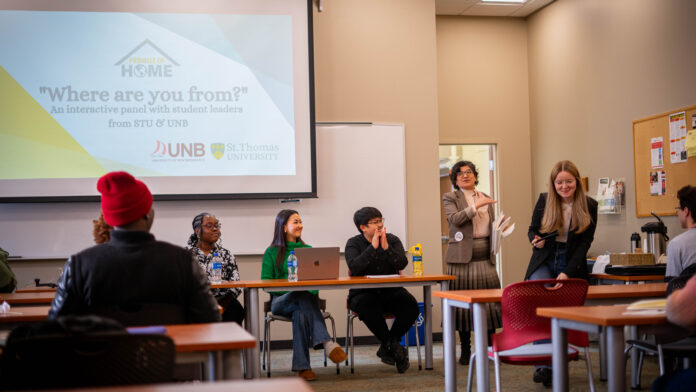

On Feb. 9, The Promise of Home advanced with its third phase of their research project with the event “Where are you from?”
At the Harriet Irving Library, international students from STU and UNB discussed the meaning of home.
According to Gül Çalişkan, the lead researcher and sociology professor, Promise of Home is a community-engaged narrativity research on collecting stories of immigrants to impact policy in the future.
“We discuss the issues that are staying in the way of making New Brunswick and in particular Fredericton home for the people who arrived from elsewhere for various reasons,” said Çalişkan.
Related: ‘We miss her so much’: International students send letters home
Related: STU professor leads Promise of Home project’s third phase
She explained the goal is to advocate for the immigrant community to the “people who can address the issues.” Their next step will be to hold meetings with different ministers that are informed by the community conversations they have.
“Between now and the town hall meetings, as a research team, we have to analyze the data we have collected to come up with policy briefs,” said Çalişkan. “We want to be the bridge between the people and the policymakers.”
The issues they hope to bring up go from health care to building friendships.
“That is in the way to make this place home,” she said. “We need to think and analyze as a community more around how we see the immigrants.”
Çalişkan said that they want to be transparent and open throughout the process to build better connections and communication among people who are building resources. Promise of Home has put stories online from immigrants living in Fredericton with a sociological perspective.
“We hope this will serve to build trust … among community members and also with the people who are in the decision-making position,” said Çalişkan.
She considers that the government has not heard enough from the international community, only “during election times.”
“It shouldn’t be government by government. It should be almost like institutional memory and transition of it from government to government.”
Çalişkan said that this will be a long process since “the nature of the research is that it has to go very slow, you cannot rush.”
“We like to see it as it’s part of a bigger process of making here home for people who are coming elsewhere and resolving those problems, they are just part of it.”
She added that before holding meetings they need to analyze the data they have collected and create knowledge mobilization pieces with her team, who have played a crucial role in this process.
“I am very proud of our research team that we have incredible research assistants, undergraduates and graduates,” said Çalişkan. “Sometimes I say, it cannot get any better than this and it gets better than that.”
The next workshop for Promise of Home will be held on March 27.
